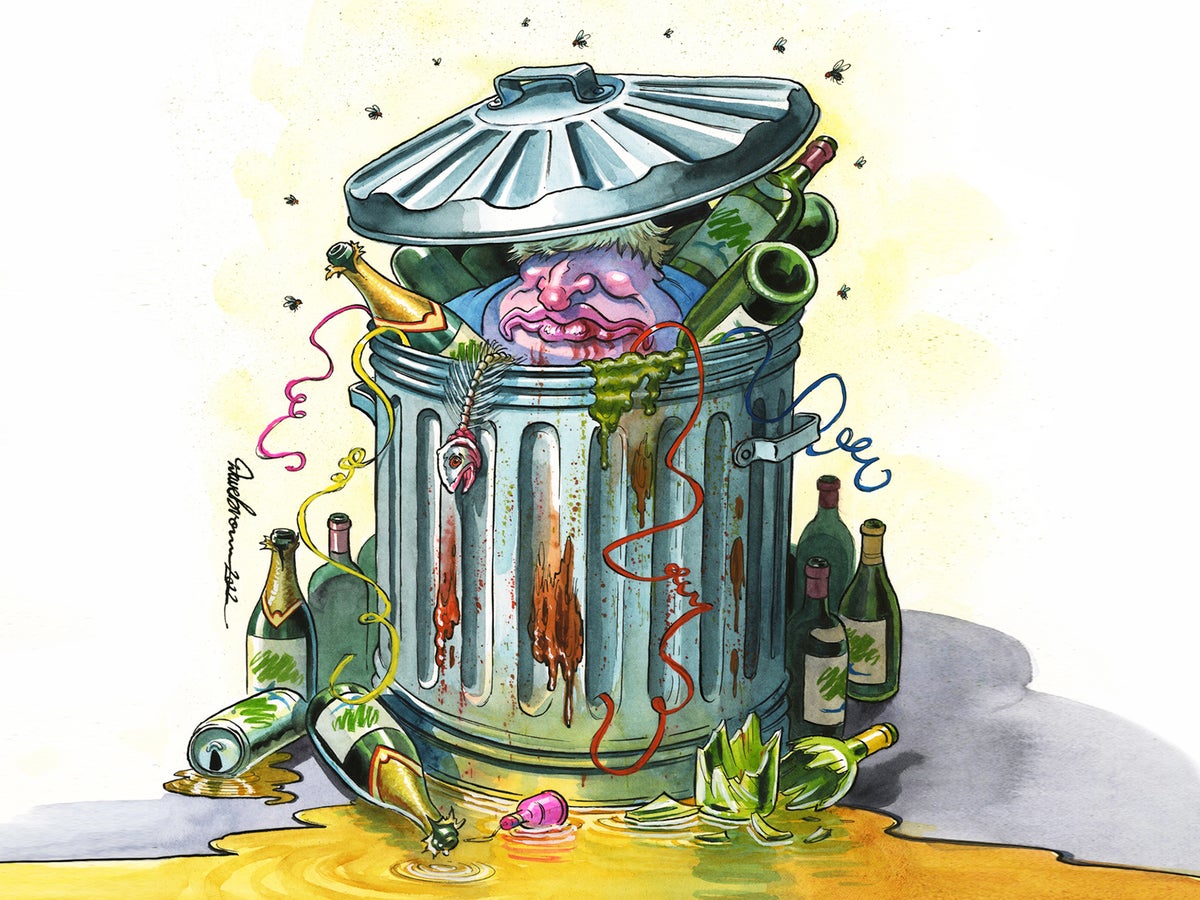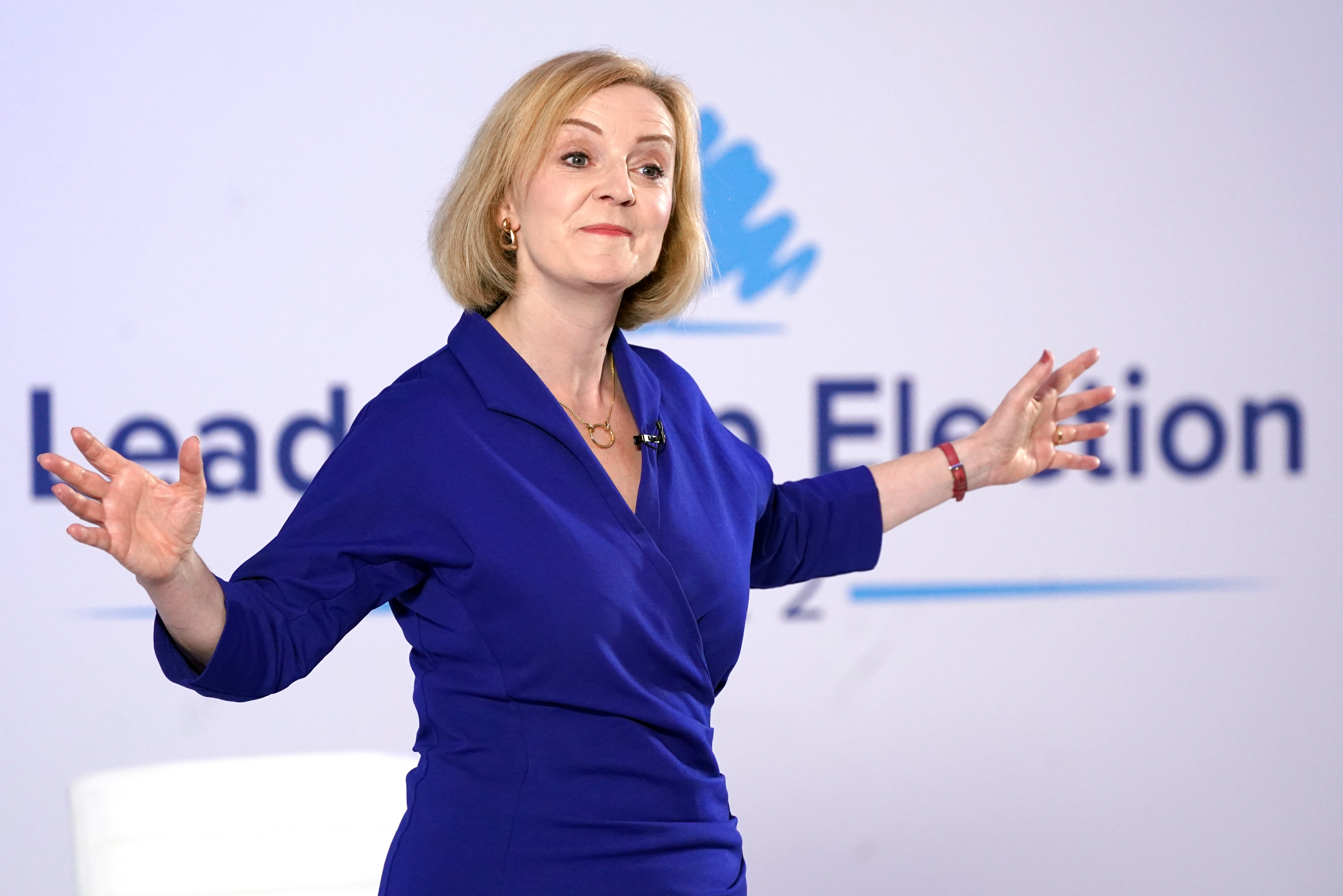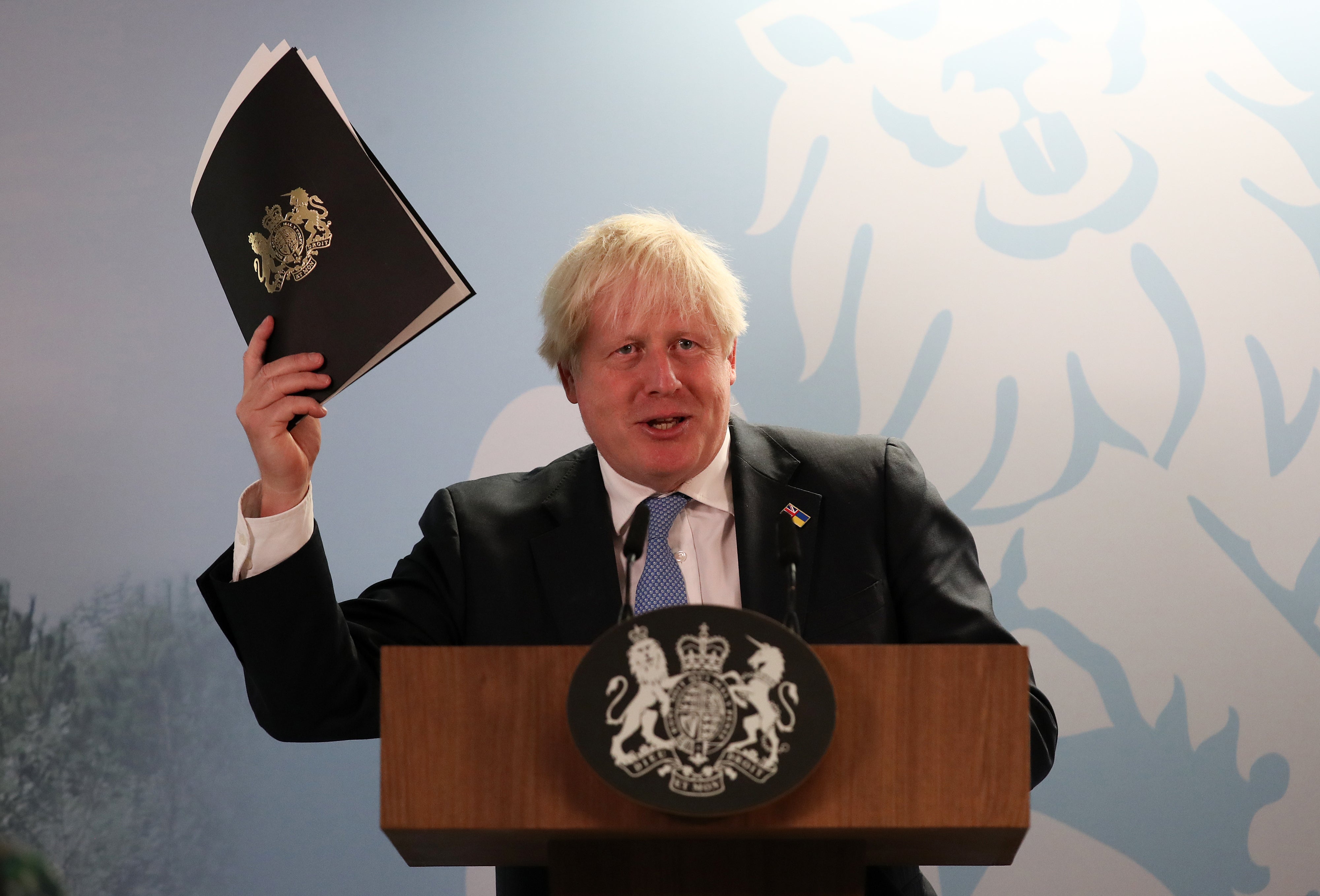
“I think he honestly believes that it is churlish for us not to regard him as an exception, one who should be free of the network of obligation which binds everyone else,” wrote Martin Hammond, Boris Johnson’s teacher at Eton, in a letter to Johnson’s father Stanley, as Andrew Gimson’s biography records. When historians make the first stab at Johnson’s political legacy, the words will not be very different.
Some Tories judge what they called their “deal with the devil” worth it. After all, Johnson did “get Brexit done” (apart from the bits, such as the Northern Ireland protocol, that are still not “done”). Yet his political epitaph will not just be about Brexit, because he was driven out of Downing Street in ignominy after repeatedly breaking the rules on standards in public life. The characteristics that appealed to his party and many voters – as an anti-establishment figure who bulldozed Brexit through – became his achilles heel when both groups tired of rule-bending to protect friends such as Owen Paterson and Chris Pincher, and denying things that were true, such as Downing Street parties during lockdown.
After the backlash, we might have expected the Conservatives to head off in the opposite direction, as parties often do when changing leaders. But it didn't happen. The change candidate should have been Rishi Sunak, who offered stability, competence and a return to fiscal conservatism. But the Tories' 160,000 Tory members had other ideas. They preferred another figure with many of Johnson’s qualities in Liz Truss who, despite joining the cabinet before Sunak became an MP, managed to portray herself as the changemaker and to cast the former chancellor as supporting the status quo and “Treasury orthodoxy”.
While offering change, Truss also positioned herself as “continuity Boris”, judging correctly that the outgoing prime minister retained strong Tory grassroots support. Sunak was viewed as the backstabber by resigning as chancellor (an unfair label because 60 ministers quit, but one that stuck).
The contest was surprisingly bitter and divisive. The tone was set in fierce clashes during the TV debates early in the election. The two candidates did not go head to head in the 12 hustings staged by the party, when they answered questions separately. By then, the damage had been done and neither was going to eat their words. Normally, political journalists have to twist a leadership campaign team’s arm to get a quote bashing their rival. This time, no-punches-pulled quotes landed in our emails on a daily basis. Even when it became clear Sunak faced defeat, he did not tone down his attacks as the Truss camp hoped, but turned the volume up. Truss allies accused Sunak of a “scorched-earth” policy that risked destroying the party.
The “blue-on-blue” attacks worried many Tory MPs and handed Labour a goldmine for the next general election. They include Sunak’s warnings that, under Truss, millions face destitution in the economic crisis, which would be a “moral failure”, and that her “unfunded tax cuts” would fuel inflation and her higher borrowing would impose a debt burden on future generations. After 12 years in power, the Tories gave the impression they were trashing their own brand.

Can the Tory family come together again and heal its wounds? In its favour is its not-so-secret weapon – unity. Even some Truss critics will give her the benefit of the doubt. It is not by accident the party has been in power for 32 of the past 50 years and was so for 60 years in the 20th “Tory century”.
Although one inheritance from Johnson is a good one – a Commons majority of more than 70 – Truss will face a big challenge in managing Tory MPs. Only 50 of the 357-strong parliamentary party voted for her in the first round of the leadership election, while 88 preferred Sunak. She has now overtaken him, by winning the support of 149 MPs to Sunak’s 132 after several belatedly clambered aboard her bandwagon to boost their career prospects when opinion polls gave her a commanding lead among members. But even now, about 200 Tory MPs have not publicly supported Truss. They include long-standing enemies who might be immune to unity pleas.
Some who rallied behind Truss are bound to miss out when she chooses her ministerial team; there won’t be enough jobs to go round. More senior figures might be offered posts further down the pecking order than they think they deserve.
Sunak will be a pivotal figure. He is not a natural rebel leader, in the way Johnson was happy to undermine Theresa May to further his leadership ambitions. Having been punished by many Tory members for alleged disloyalty, Sunak would not want to compound the charge if he harbours hope of a future leadership bid. He has hinted that the divisions with Truss are too deep for him to serve in her cabinet. Despite his denials, some Tory MPs expect him to walk away from politics.
Truss will want to avoid Johnson’s shambolic, chaotic style of government
Team Sunak members who have launched the strongest attacks on Truss, such as Dominic Raab, the deputy prime minister, could find themselves in the wilderness. Truss might offer an olive branch to some less vocal Sunak supporters in the hope of building bridges. She will try to bind in “one nation” Tories by handing a cabinet job to Tom Tugendhat, although some of his backers were surprised he endorsed Truss when he was eliminated from the race.
There is a risk that Tory moderates view the new cabinet as a further “lurch to the right” and a repeat of Johnson’s mistakes in appointing ultra-loyalists rather than the government of “all the talents” Truss has promised. Johnson forced out pro-EU Tories such as Dominic Grieve, David Gauke, Rory Stewart and Amber Rudd, and the rightward shift continued in the leadership election: bizarrely, a pro-Brexit, Thatcherite Conservative in Sunak was branded a “socialist” by the Truss camp. It is doubtful voters would warm to a right-wing prospectus at the next election, when Truss will not hold two trump cards Johnson had in 2019: Brexit as a live issue and Jeremy Corbyn.
Truss will not want to be “continuity Boris” in one sense. She will want to avoid his shambolic, chaotic style of government. She will come in with clear goals but translating them into policies, rather than being buffeted around by events, will require an iron will and determination, as well as a very strong top team of ministers and advisers.
The test will be her response to the living standards crisis, and it will be immediate. There are real fears among Tory MPs that, while helping low-income households and bringing in tax cuts that disproportionately help the better off, she will not do enough for the “squeezed middle”. The need to spend billions on helping people and businesses with their bills will make it hard for Truss to keep the £50bn of promises she made during the contest. Her dilemma is that right-wing allies will not want any retreat from her low-tax, low-regulation agenda, but to implement it and keep borrowing under control she might need to squeeze public spending, which would be unpopular with voters, particularly in the red wall.

Truss’s party management challenge will be made harder by Johnson’s presence on the backbenches. He wanted her to defeat Sunak, but his real choice for Tory leader was himself. He didn’t view Truss as his favoured successor: he made her foreign secretary to create a counterweight to Sunak and, when he added the Brexit brief later, her allies saw it as a poisoned chalice.
Johnson has already rewritten history, weaving a narrative that he was needlessly toppled in a coup. Never mind that 72 per cent of the public had an unfavourable view of him and that no prime minister can survive without the confidence of their MPs. Johnson’s “hasta la vista, baby” Commons farewell and declaration that his mission had been “largely accomplished, for now” encouraged the idea he would make a comeback, like his hero Winston Churchill, who returned six years after losing the 1945 election. Polls suggest many Tory members regret Johnson’s departure and Tory voters prefer him to both Truss and Sunak. His acolytes are trying to intimidate the Commons privileges committee, which is investigating whether he lied to parliament over Partygate (and could end his parliamentary career).
Johnson’s state of Trumpian denial is dangerous for Truss and poisonous for the Tories, prolonging the divisions she wants to end. If Truss hits hard political times, as she is bound to do during the economic crisis, Johnson acolytes would be tempted to say he would have done better. The talk of a comeback would get louder. If the Tories faced electoral defeat, could they again ditch an unpopular leader and turn in desperation to Johnson, as they did in 2019? Sensible Tory MPs would surely have none of it, fearing the public reaction to the return of a leader who had resigned in disgrace? Although I don’t think it will happen, the fanciful idea cannot be entirely ruled out while it still exists in the minds of Johnson and his remaining followers. This makes Truss’s already daunting task even more difficult.
It is why some Tories think Truss will not become another Margaret Thatcher but a second Iain Duncan Smith. Like Truss, he enjoyed the support of only a third of Tory MPs in their final vote when he was elected in 2001. In the members’ ballot he also defeated a former chancellor who was more popular than him among MPs (Kenneth Clarke). Duncan Smith never won the confidence of his MPs, who ousted him two years later. Ominously for Truss, one former minister told me: “I can see history repeating itself.” But we shouldn't underestimate her determination to write a different version.







